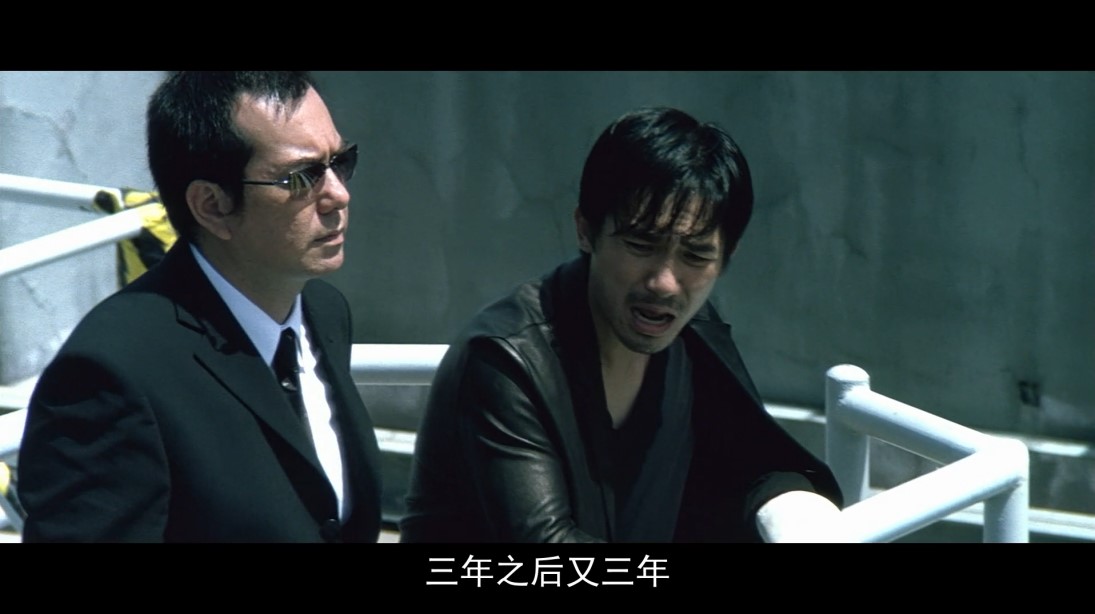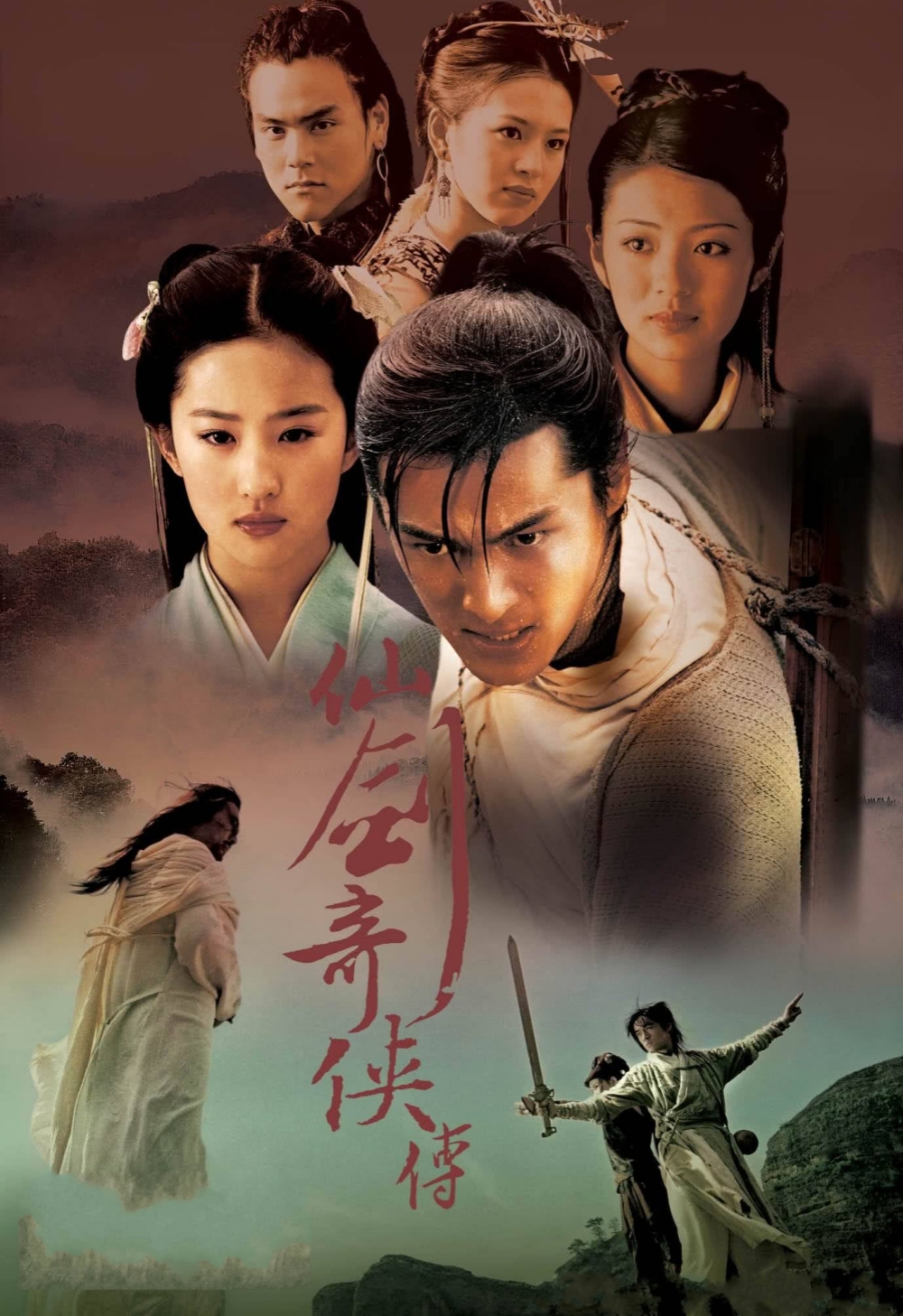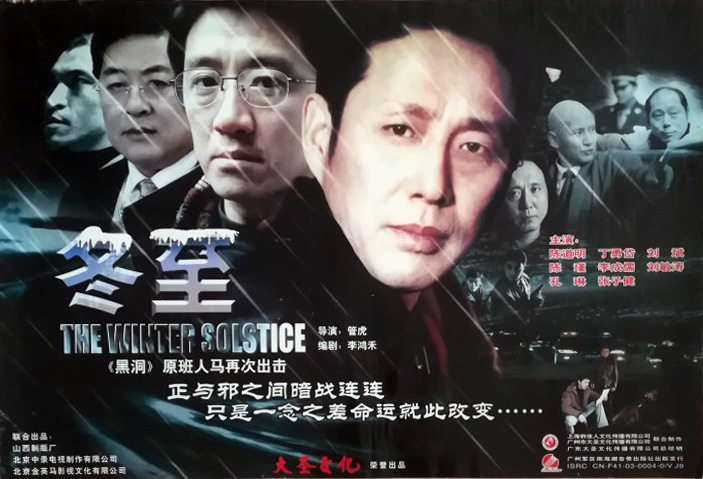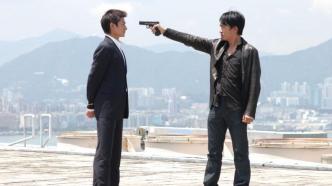
Editor's note: This is a nostalgic theater.
The first part of "Infernal Affairs" was released in Hong Kong on December 12, 2002. It has been 20 years now.
For many friends in their 30s, "Infernal Affairs" is probably one of the few Hong Kong classics they can recognize. Having not experienced the baptism of the era of video halls, their impression of "Hong Kong films" may only stay in a few hit films such as "A Chinese Journey to the West", "The King of Comedy", and "Infernal Affairs". In fact, this is the end of the golden age of "Hong Kong movies".
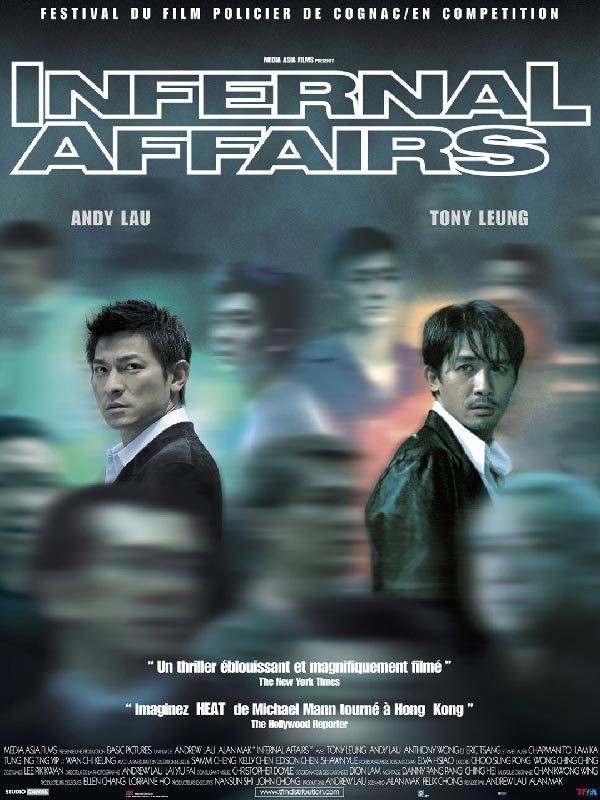
The French version of the poster of "Infernal Affairs" is quite like a Wong Kar Wai literary film
For the development of Hong Kong films, a new wave of film development began in the 1980s. A large number of realistic films with sharp styles were first born. In the 1990s, Stephen Chow's nonsensical comedy style was produced, and a large number of excellent directors with different styles appeared, such as Wong Kar Wai, Chen Kexin, Johnnie To, etc., entering a truly flourishing world. period.
For the Hong Kong film market, which has always been based on commercial income, due to the skyrocketing box office during this period, the commercial and cultural radiation effects of "Hong Kong films" in cultural circles such as Southeast Asia, Japan, and South Korea have also increased day by day. It also entered the field of vision of European and American movies. The unique artistic value and style of "Hong Kong films" reached its peak during this period. A number of "video halls" that have sprung up in large and small towns in the mainland are also playing loops of Hong Kong-produced films dubbed from pirated video tapes. Even though many commercial masterpieces have been released in Hong Kong theaters for many years, mainland audiences still enjoy watching them. Fascinated.
Looking back now, this is probably the most glorious period of Hong Kong movies in the past and in the next few decades. With the impact of a series of political and economic events such as Hong Kong's return to the motherland and the Asian financial turmoil, the development history of this Hong Kong film entered a very rapid decline at the turn of the century. "Infernal Affairs" was a box office salvage work and a confidence-boosting work back then, but looking at it today, it can only be said that no matter how hard you try, it is difficult for individuals to recover from the general trend of the ebb tide of the times.
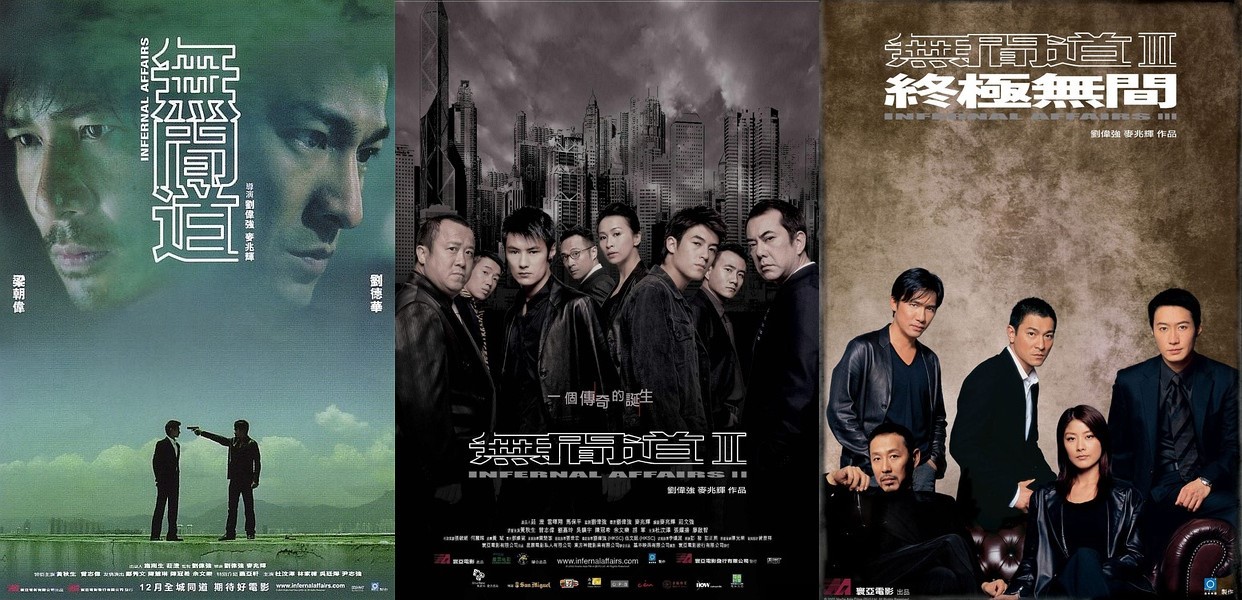
"Infernal Affairs" trilogy poster
Since then, Hong Kong films have become more and more confined to the small area of Hong Kong in terms of production quantity, style and creativity, and most importantly, the radiation effect of film culture. Watching today's Korean movies, you can often see Koreans' pursuit of previous generations of Hong Kong movies, such as the children's memory of "Maggie Cheung" in "Please Answer 1988". But such influence basically disappeared after 2000. Until now, there are occasional Hong Kong-produced films that have two or three box office hits every year, and they have to rely on the mainland market for their achievements. But these commercially successful works will soon be forgotten, and no one will mention them again after a few years.
The "Infernal Affairs" series trilogy, in this sense, is the final curtain-raising performance for the most glorious golden age of Hong Kong films.
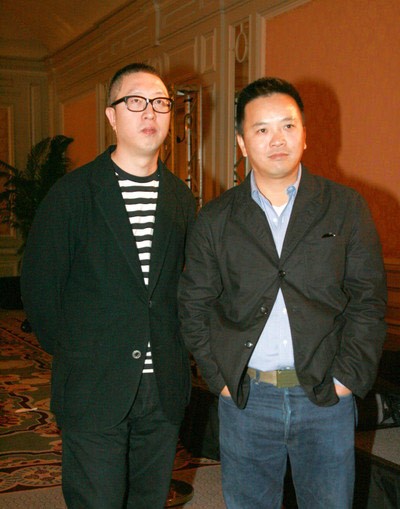
The screenwriters of the film are Chong Man Keung and Mak Siu Fai. Both of them are born on January 1st, Mak Siu Fai is slightly older by three years, it can be described as "a match made in heaven"
Why is "Infernal Affairs" enough to carry such praise? There is no doubt that the film is excellent. First of all, its excellence is the script jointly created by screenwriters Mak Siu-fai and Zhuang Wenqiang.
The first part of "Infernal Affairs" tells the story of a "marginal man" that has existed since the New Wave of Hong Kong films in the 1980s. The particularity of the identity of "undercover agent" makes the protagonist's standpoint of good and evil often fluctuate, and the "identity" of himself often becomes confused and shaken. For Hong Kong, a free port at the angle between Eastern and Western cultures, this confusion of cultural identity is not only reflected in movies, but also in novels and other cultural works, such as the story of "Farewell My Concubine" created by writer Li Bihua. It can be said that "undercover", including film elements such as "cops", "gangs" and "loyalty", is a type of motif that Hong Kong culture is best at expressing, and it is also a type of work that best fits the mood of local audiences.
For the two screenwriters of "Infernal Affairs", based on many similar works, they chose a well-conceived counterpoint writing method, combining "the undercover gangster among the police" and "the undercover policeman among the gangsters" together. The description makes the actions of the two protagonists often reflect each other like a mirror image, which makes the story more confusing and exciting. At the same time, there is also Wu Yusen, and even the earlier Shaw Brothers era, the taste of "heroes cherish who is the opponent", it is a heroic drama that quite highlights male hormones. The element of "wisdom fighting" also runs through all the scenes of the film, making suspense firmly grasp the audience, and the rhythm is quite tight. These have laid the foundation for "Infernal Affairs" to become an excellent commercial police film.
Then "Infernal Affairs" was adapted by Hollywood into "Infernal Affairs" (2006), and South Korea's adaptation into "New World" (2013), which was also well received, fully demonstrating that at the story level, "Infernal Affairs" is outstanding.
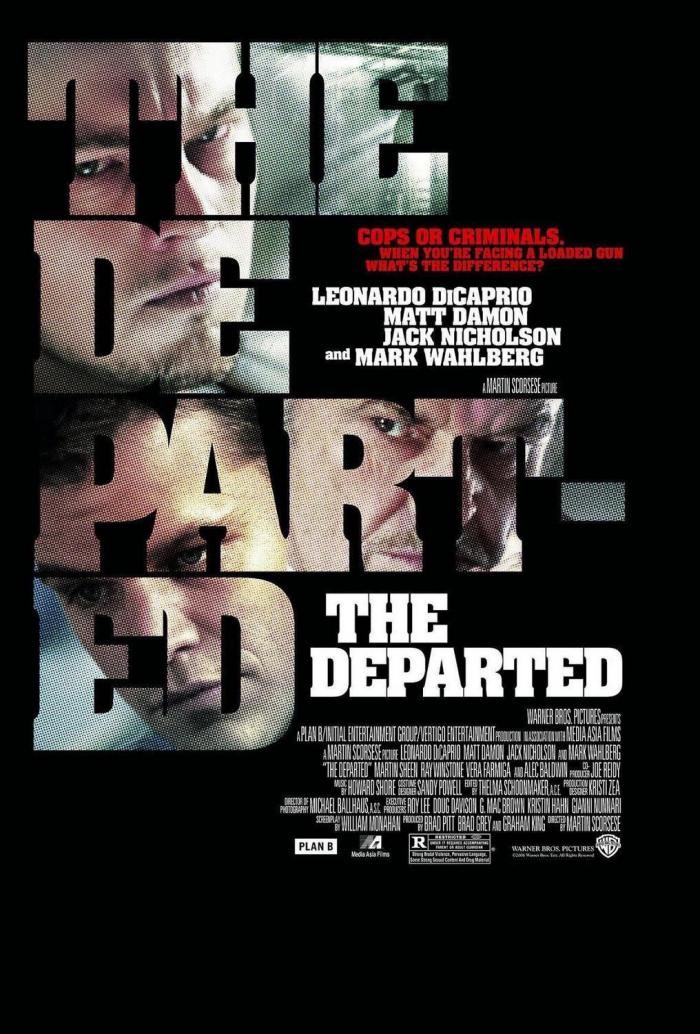
"Infernal Affairs" won many awards such as the best picture of the 79th Oscar, which shows that it has been successful in Europe and the United States. But for Chinese-speaking audiences who have watched "Infernal Affairs", they always feel that the film has been changed a bit "weird".
On top of the script, what is more successful is actually the overall style setting and control of the film. This is due to the joint direction of Liu Weiqiang and Mak Siu-fai, who successfully created the visual characteristics of the film in addition to the text of the script, and also used many audio-visual elements to strengthen the theme of "marginal people" in the film.
For example, the concept of "Infernal Affairs" is introduced from the beginning of the film, and contexts such as reincarnation and hell are used to explain the situation of "undercover". This is also the source of the title "Infernal Affairs". It not only adds a sense of fate to the protagonist's story, but also uses religious imagery to strengthen the heavy atmosphere of the film. Even the first shot and scene of the film, where the gangster uses "loyalty" to brainwash the younger brother to go undercover in the police station in the temple, runs through this visual imagery.
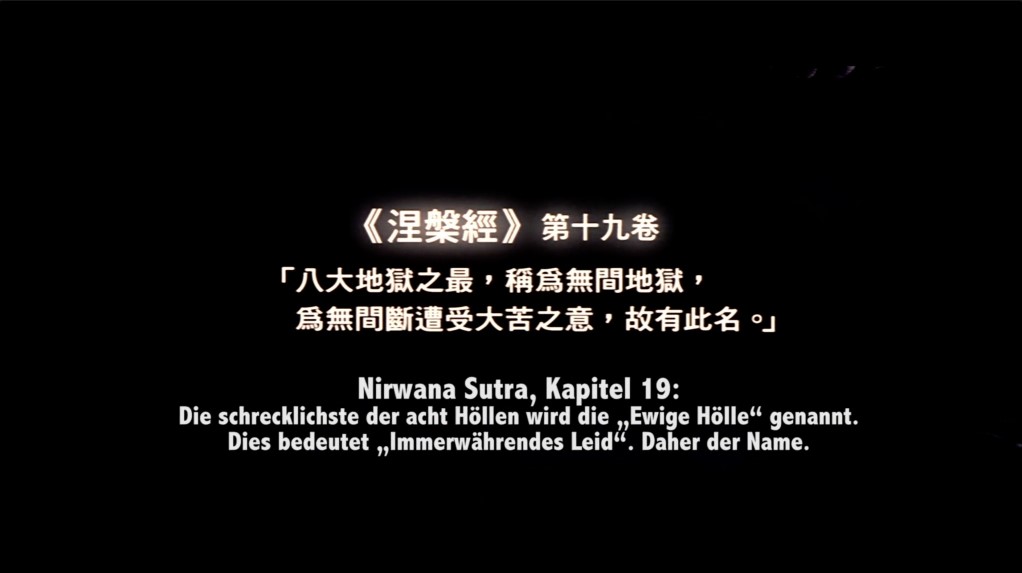
Explanation of the title at the beginning of "Infernal Affairs"
Under the consideration of this design, in fact, many scenes and art choices are also trying to create a heavy feeling different from the atmosphere of the market. For example, the place where gangsters gather is the big brother's bar, but it is not the noisy wine bar where gangsters often go in normal life, and it has a quiet atmosphere. Or the big brother of the gangster and Liu Jianming meet in the movie theater. Although it does not conform to the characteristics of the activities of the gang members in reality, it conforms to the artistic atmosphere that the film generally wants to pursue.
In the most important ending, in the scene of "undercover going to the roof", although the "roof" is in line with the commanding heights, it can be seen at a glance. The lens depictions of light, reflection, and mirror are all artistic designs that conform to the psychological state of the characters, creating a complex flavor of self-examination, confrontation between the enemy and ourselves, and psychological division.
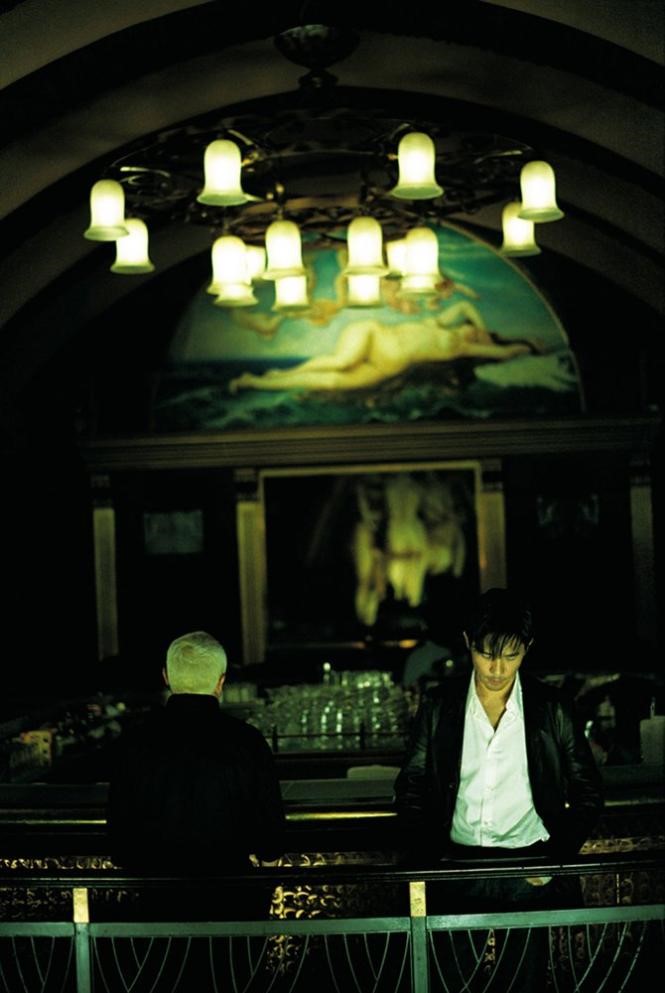
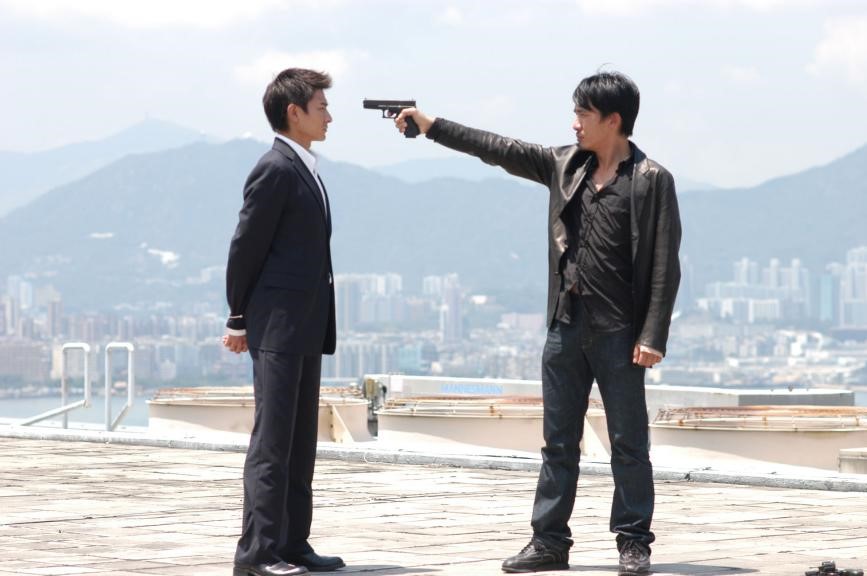
Whether it is a bar or a rooftop, the empty scenes have a freehand feel. The so-called "one thought of hell, one thought of heaven" seems to be full of religious meaning
When it comes to the music of "Infernal Affairs", in addition to the classic melody of "Goodbye Police", many people think of the lyrics of "Who is knocking on my window...". The "Forgotten Time" sung by Tsai Chin also has a sense of Zen and nostalgia. It is not common to use it in police and gangster films, but it creates a state of mind with a sense of regret for the protagonist, which also belongs to the overall style of the film. Want to reinforce the vibe.
All these audio-visual features of "Infernal Affairs" are not as ostentatiously used as art films, but hidden under the appearance of commercial films, but in fact they are not much simpler than art films. These are not easy to be noticed by the audience outside the plot, but subtly constitute the artistic innovation of the film style.
In fact, in the Hollywood adaptation of "Infernal Affairs" a few years later, the storyline basically follows "Infernal Affairs", but the overall look and feel of the film is quite different. It is these style elements that have changed, creating a completely different film theme and artistic features. . Director Martin Scorsese was very good at depicting the detailed relationship between gang groups formed by immigrants and the community environment in specific cities and regions before, and also designed the background of Boston and Irish immigrants for the story. This adapted film has gained a lot in the next year's Oscars, showing the American audience's recognition of the artistic quality of the film.
However, among Chinese-speaking audiences who have watched "Infernal Affairs", the "American version of Infernal Affairs" does not necessarily have much praise. Even ten years later, the evaluation of the Korean version of "New World" is higher than that of the American version. The difference is that for the traditional Greater China cultural circle, the audience can easily understand the themes and pressure of characters such as "loyalty among gangsters" and "challenge of undercover identity to moral dilemma". All the art designs of "Infernal Affairs" are strengthening the theme of the characters' "moral dilemma". In the US version adaptation, these styles serve the new theme of "environment makes man". The difference between them is contained in the design of the overall style of the film and the details of expressing the theme. It can also be shown from the side that the original theme and style of "Infernal Affairs" were quite successful for Chinese-speaking audiences.
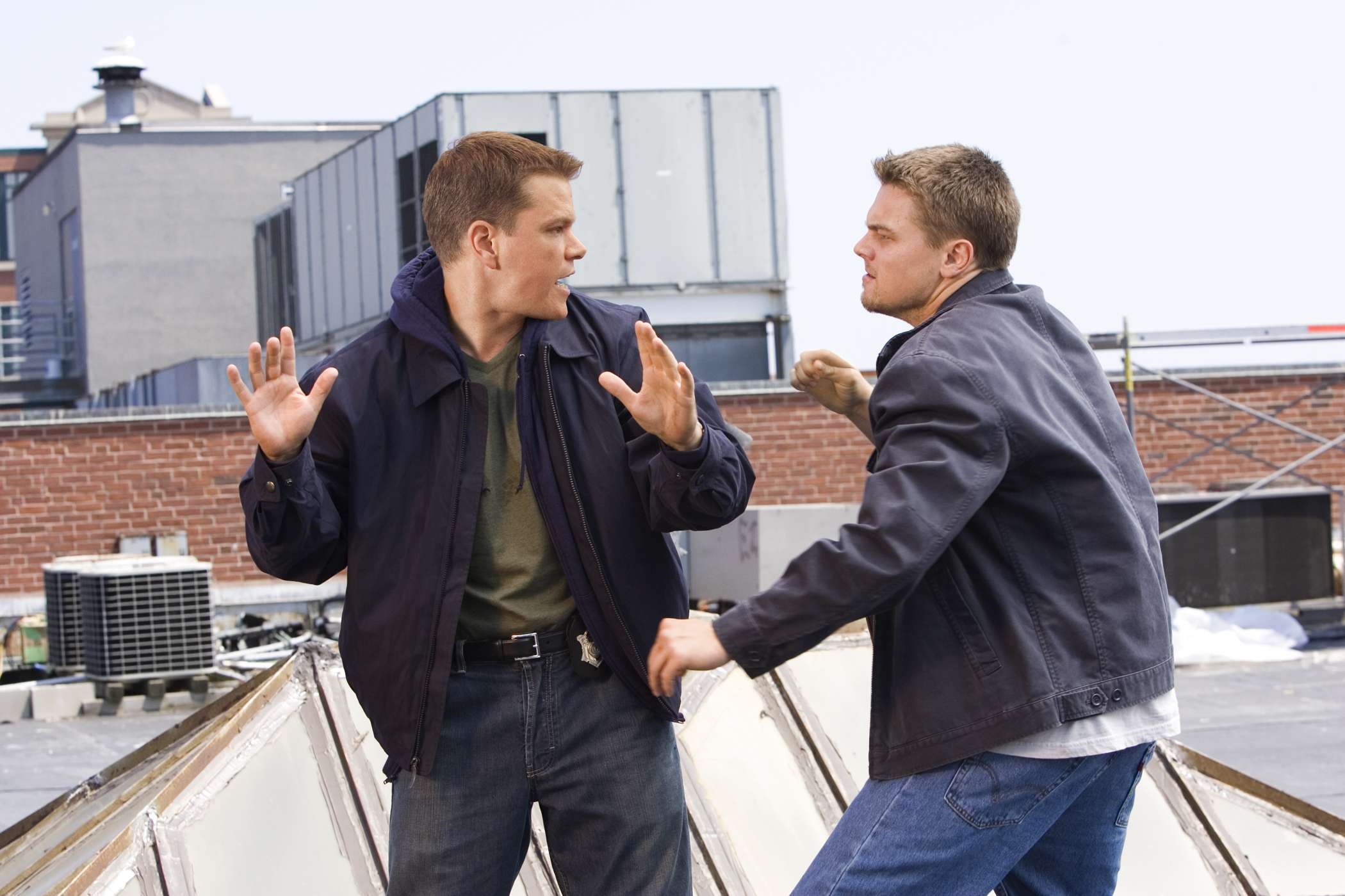
The undercover agents of "Infernal Affairs" will also go to the rooftop. But whether it is the environment or the actions of the characters, it seems that they are moving closer to the reality of life. The so-called artistic difference between realism and freehand brushwork. The Hong Kong version of "Infernal Affairs" is not obvious, but the overall design is very artistic
The film's thematic variations, while not easily recognizable, are real. After the great success of "Infernal Affairs", "Infernal Affairs 2" also received quite good reviews. Many viewers think that although 2 is related to the plot of 1, the focus of the story is different. They put a lot of ink on the gangster Ni's family, especially the gang leader Ni Yongxiao who doesn't have much role in the role. In fact, it is also because "Infernal Affairs 2" borrowed more on the theme of the "Godfather" series, and quietly converted the core of "cops and robbers" into "historical facts of gangsters", that is, "family interests are higher than family interests" common in American film and television dramas. everything" perception. Ni Yongxiao, the young "godfather", has also become the most spotlight-stealing character in the whole play, which is also an interesting reference and localization innovation of Hong Kong films.
In "Infernal Affairs 3 Ultimate Infernal Affairs", the theme of "Infernal Affairs 3" has been upgraded to a rather complicated "multiple undercover struggles and the protagonist's mental breakdown". Really psychological suspense drama. In terms of the plot, this adaptation, which runs through the three undercover gangster Liu Jianming's mentality changes, is written very clearly. It can be regarded as drawing an ending for the trilogy, but the style is a bit weird, which makes the evaluation of the ending chapter, Not necessarily as good as the first two.
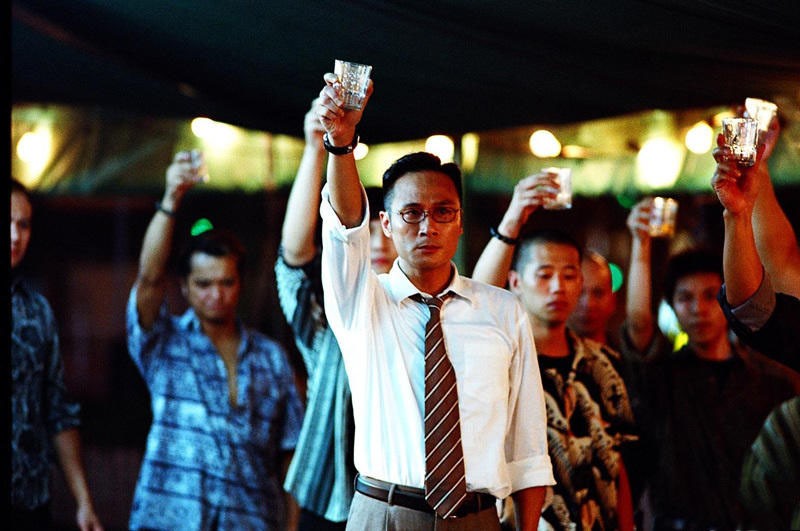
The artistic style of epic drama created by "Infernal Affairs 2" is also quite successful, making the atmosphere of the theme more dignified and poetic. It's a pity that the previous work was too good, and the value of the sequel has been concealed by the halo.
Even though the styles of the "Infernal Affairs" trilogy are different, after the success of the first part, the production scale and cast of the latter two still expanded, and many outstanding Mesozoic actors in Hong Kong were recruited. Apart from Tony Leung and Andy Lau continuing to star, Eric Tsang Chi Wai and Anthony Wong Chau Sang's supporting roles are still outstanding, afterwards Francis Ng, Carina Lau, Liming and others performed in their own way. The addition of young actors such as Edison Chen and Shawn Yue also brought a youthful atmosphere to the film. Even Hu Jun starred in the second part, and Chen Daoming and Huang Zhizhong were invited to star in the third part-although the acting styles of several mainland actors may not match well with Hong Kong actors, but the group play supported by so many stars, Making each character's performance quite dazzling, each with its own style in the few scenes, was a major event in film creation back then.
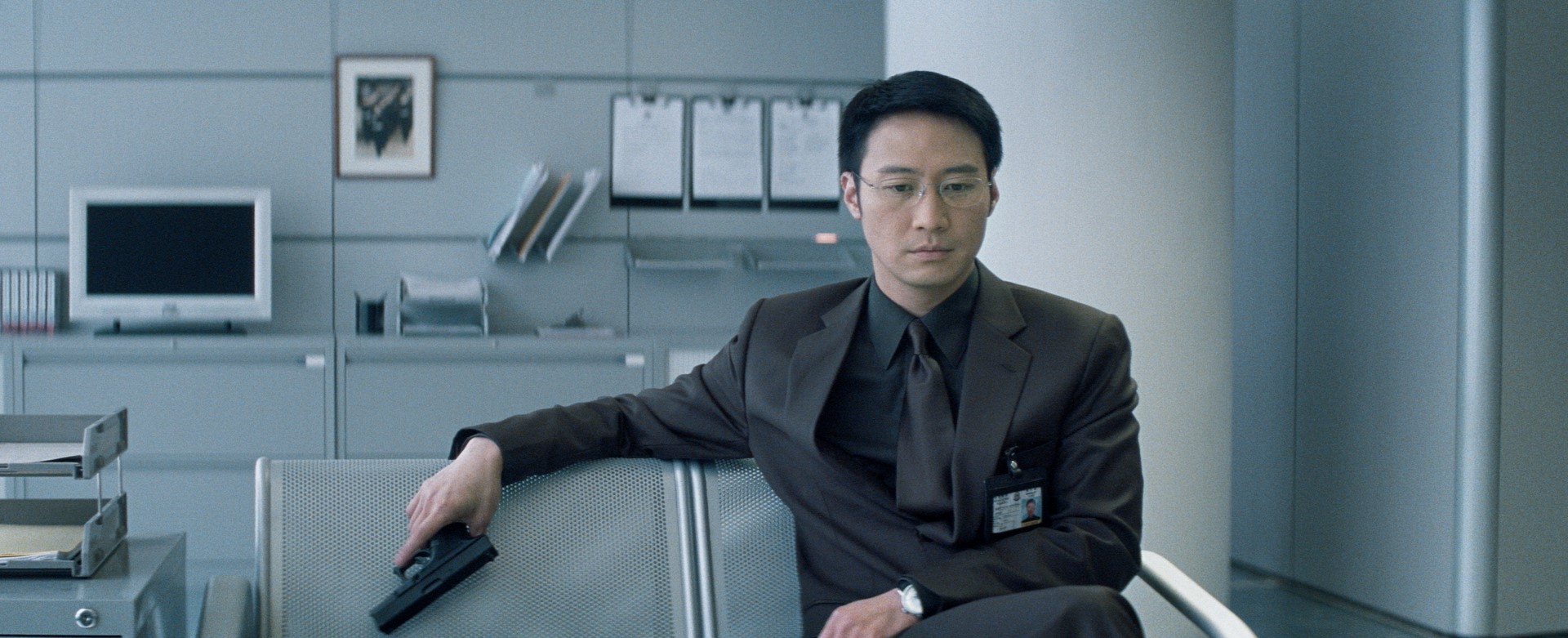
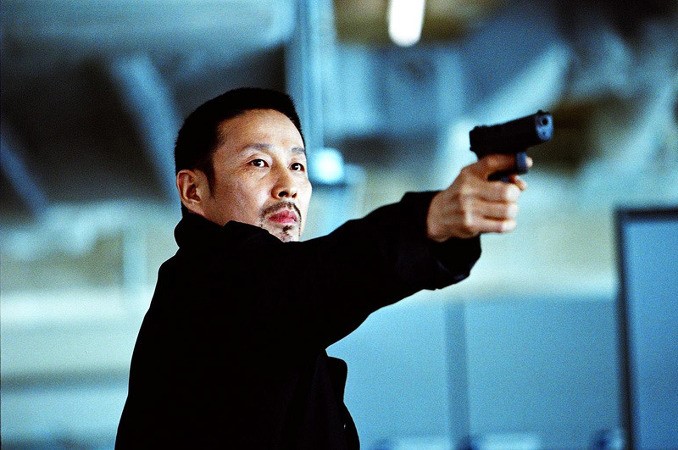
"Infernal Affairs 3" is called "Ultimate Infernal Affairs", because it pursues the complexity of the story too much, which makes the film style quite weird. The performances of the new characters all feel a bit abrupt. Fortunately, the final ending of the characters in the story is still satisfactory, but the overall look and feel of the film is not as good as the previous two films.
The so-called pure Hong Kong films, excellent works have always been "everything is too much, everything is crazy", that is, in the seemingly popular plot, there are some portrayals of characters and quite distinctive artistic features. Although it is a bit artificial when you think about it carefully, many points can be moving and thought-provoking.
Take the "undercover" in "Infernal Affairs" as an example, the sentence "I want to be a good person", the sentence "I'm sorry, I'm a policeman", and the sentence "It's been three years, and three years" can make everyone remember, just It has been considered a success. Although the last few simple shots of "Infernal Affairs" were accompanied by a few lines of text in the 2013 public release in mainland movie theaters, Liu Jianming was finally brought to justice, but in the original Hong Kong version, it still has a rather tragic ending— ——The good guy Chen Yongren may not have good rewards, but the bad guy Liu Jianming also lived an unhappy life. Perhaps under the mockery of the times and fate, the little people are all fallen leaves flying in the wind. Even if they struggle, they are just swaying with the wind, obeying the orders of the upper hand, and cannot get the freedom they want.
Watching "Infernal Affairs" 20 years later, this feeling is even more specific and profound than it was back then. It can be seen that the intensity of emotion that the film wants to convey has been able to reach audiences of different ages across eras.
